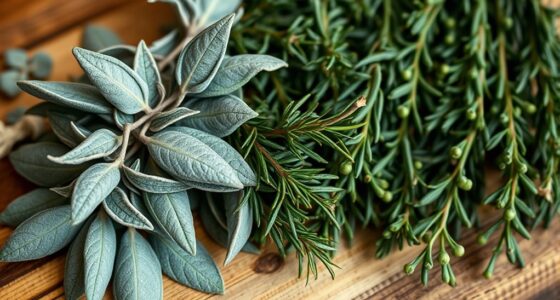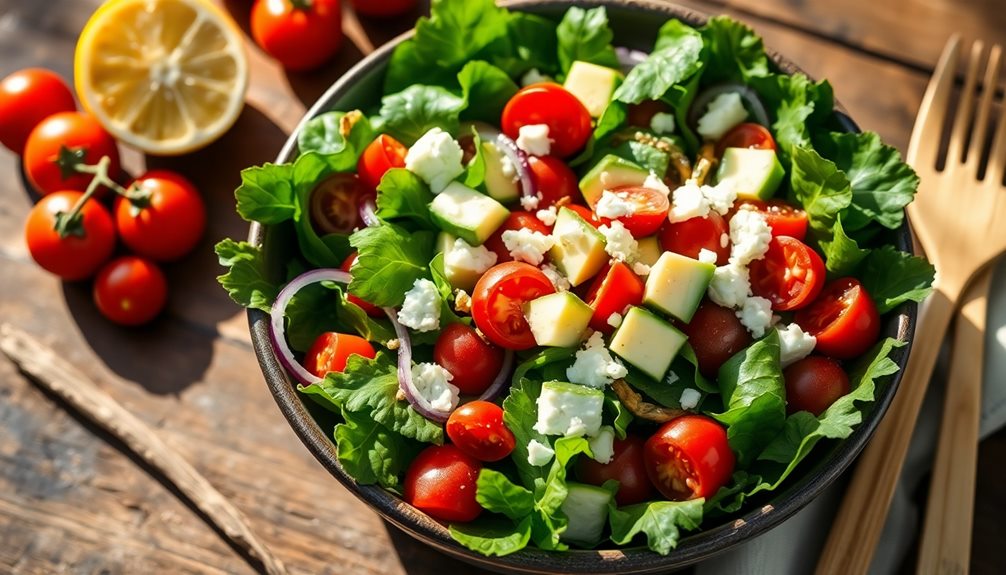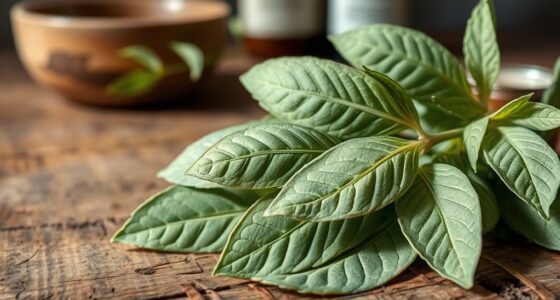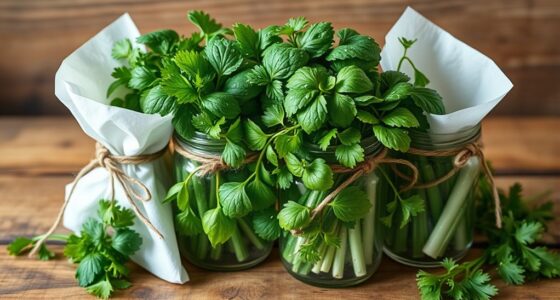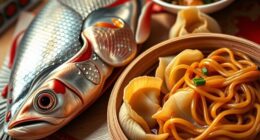Incorporating garlic, ginger, and honey into your cooking can boost both flavor and health. Garlic supports your immune system, reduces inflammation, and promotes heart health, while ginger aids digestion, eases nausea, and improves circulation. Honey adds natural antimicrobial benefits and soothes sore throats. Using these herbs, you naturally enhance your dishes and support your well-being. Keep exploring how these powerful ingredients can transform your meals and your health in ways you might not expect.
Key Takeaways
- Garlic enhances dishes with flavor while boosting immunity and supporting cardiovascular health through compounds like allicin.
- Ginger adds a warming spice, aids digestion, reduces nausea, and has anti-inflammatory properties.
- Honey’s antimicrobial and anti-inflammatory qualities make it a natural remedy for coughs, sore throats, and healing foods.
- Combining garlic, ginger, and honey in cooking can enhance flavor and provide medicinal benefits.
- Regular use of these herbs supports overall wellness, immunity, and reduces inflammation naturally.

Have you ever wondered how herbs can do more than flavor your dishes? It turns out that many herbs have powerful medicinal herb uses, making them invaluable for both cooking and health. When you incorporate herbs like garlic, ginger, and honey into your meals, you’re not just enhancing taste—you’re also tapping into their natural healing properties. This blend of culinary herb benefits and medicinal applications makes these ingredients versatile staples in your kitchen.
Garlic, for instance, is renowned for its immune-boosting qualities. Its active compounds, such as allicin, have been linked to reducing inflammation and fighting infections. When you add garlic to your recipes, you’re not only elevating the flavor with its pungent aroma but also giving your body a natural defense boost. Its medicinal herb uses extend beyond the kitchen; garlic has been used traditionally to lower blood pressure and cholesterol levels, supporting cardiovascular health. Incorporating garlic regularly can help you enjoy its health benefits without sacrificing flavor, making it a perfect example of how culinary herb benefits align with medicinal uses.
Garlic boosts immunity, reduces inflammation, and supports heart health through its powerful active compounds.
Ginger is another powerful herb with a dual role. Known for its spicy, warming taste, ginger aids digestion, reduces nausea, and has anti-inflammatory properties. When used in cooking, ginger can brighten up a wide range of dishes—from stir-fries to baked goods—while also providing medicinal benefits. Its bioactive compounds, like gingerol, help alleviate muscle pain and improve circulation. Because of its effectiveness in supporting digestion and reducing inflammation, ginger’s medicinal herb uses are well-documented across cultures. When you incorporate fresh or powdered ginger into your meals, you’re doing more than adding flavor—you’re actively supporting your gut health and reducing discomfort.
Honey, though not an herb, is often included in discussions about herbal remedies because of its healing properties. It’s naturally antimicrobial and soothing, making it a popular choice for coughs, sore throats, and minor wounds. When used in cooking or taken raw, honey offers antibacterial benefits and can calm inflammation. Its culinary herb benefits include adding a touch of sweetness that complements herbs like ginger and garlic, enhancing both flavor and healing properties. Using honey in your recipes can help you harness its medicinal qualities effortlessly, turning everyday dishes into nourishing remedies.
Frequently Asked Questions
Can Herbal Remedies in Cooking Replace Medical Treatments?
Herbal remedies in cooking can’t replace medical treatments because they lack the medical efficacy and scientific evidence needed for serious health conditions. While garlic, ginger, and honey may support your well-being and boost immunity, they shouldn’t be a substitute for professional medical advice or prescribed treatments. Always consult a healthcare provider before relying on herbal remedies for health issues, especially when dealing with chronic or severe conditions.
Are There Any Allergies Associated With Garlic, Ginger, or Honey?
You should be aware that garlic, ginger, and honey can cause allergy symptoms in some people. Common allergen precautions include watching for reactions like skin rashes, swelling, or breathing issues. If you notice any symptoms after consuming these, stop use immediately and consult a healthcare professional. Always check ingredient labels and talk to your doctor if you have known allergies to ensure safe consumption.
How Do Herbal Remedies Affect Cooking Shelf Life?
Like a guardian at the gates of Troy, herbal remedies such as garlic, ginger, and honey defend your food. They enhance preservation effects by slowing microbial growth, extending shelf life. Their natural antimicrobial properties inhibit bacteria and fungi, helping your dishes stay fresh longer. Incorporate these ingredients thoughtfully, and you’ll enjoy richer flavors and increased longevity, making your culinary creations both tasty and resilient against spoilage.
What Are the Best Storage Methods for Fresh Herbs?
For herb preservation, you should store fresh herbs properly to maintain their flavor and freshness. Wrap them loosely in a damp paper towel and place in a resealable bag or container. Alternatively, you can keep them upright in a glass of water with a plastic bag over the top. Store herbs in the refrigerator’s crisper drawer or a cool, dark place. Proper fresh herb storage extends their shelf life and preserves their herbal qualities.
Can Herbal Remedies Enhance Flavor Without Overpowering Dishes?
Yes, herbal remedies can enhance flavor through subtle infusion without overpowering dishes. You can achieve this by adding small amounts of ingredients like garlic, ginger, or honey during cooking, allowing their natural flavors to meld seamlessly. This method offers flavor enhancement, creating depth and complexity while maintaining balance. Use fresh herbs or extracts carefully, tasting as you go, to guarantee a delicate, flavorful result that complements your dish perfectly.
Conclusion
While herbs like garlic, ginger, and honey add vibrant flavors to your dishes, they also work quietly as powerful remedies. Their warmth and sweetness contrast with the medicinal benefits they offer—inviting you to nourish your body while delighting your senses. By blending culinary art with natural healing, you turn everyday cooking into a mindful ritual. So, embrace these humble ingredients; they’re both your kitchen’s flavor and your wellness allies, waiting to enrich your life in unexpected ways.


